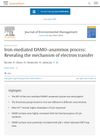November 2020 in “IntechOpen eBooks” Not getting enough minerals can lead to health problems and shorter lifespans.
January 2024 in “Ageing & longevity” Good nutrition and essential trace elements like zinc, selenium, and iron are important for a strong immune system and reducing COVID-19 severity.
 January 2024 in “International journal of chemical research and development (Print)”
January 2024 in “International journal of chemical research and development (Print)” Low levels of vitamin B12, iron, ferritin, and zinc are linked to hair loss in Iraqi women.
 83 citations,
April 1992 in “Clinical Endocrinology”
83 citations,
April 1992 in “Clinical Endocrinology” Having enough iron improves the effectiveness of a specific hair loss treatment in women.
 November 2023 in “Cureus”
November 2023 in “Cureus” Most people in Jazan know about vitamin D, zinc, and ferritin's link to hair loss but don't practice enough preventive measures.
 10 citations,
August 2012 in “Current Problems in Pediatric and Adolescent Health Care”
10 citations,
August 2012 in “Current Problems in Pediatric and Adolescent Health Care” Hair changes can indicate systemic diseases or medication effects.
 January 2022 in “Clinical Cases in Dermatology”
January 2022 in “Clinical Cases in Dermatology” Lack of certain nutrients may contribute to hair loss and proper diet or supplements could improve it.
 October 2022 in “Pediatric Dermatology”
October 2022 in “Pediatric Dermatology” Most children with rapid hair loss had a known cause, with stress and illness being top triggers, and treatments showed similar improvement.
 January 2022 in “Indian journal of dermatopathology and diagnostic dermatology”
January 2022 in “Indian journal of dermatopathology and diagnostic dermatology” Women with diffuse hair loss often have lower iron and vitamin D levels, but their thyroid function is typically normal.
 May 2023 in “Elsevier eBooks”
May 2023 in “Elsevier eBooks” Some nutritional supplements may help thicken hair in people with hair loss, but taking too much can cause side effects.
 June 2023 in “Skin Research and Technology”
June 2023 in “Skin Research and Technology” The supplement with amino acids, iron, selenium, and marine hydrolyzed collagen improved hair growth more than drug treatment alone, with most people tolerating it well.
 October 2023 in “Journal of Preventive Diagnostic and Treatment Strategies in Medicine”
October 2023 in “Journal of Preventive Diagnostic and Treatment Strategies in Medicine” Low ferritin and Vitamin D levels may cause hair loss after COVID-19.
 February 2019 in “Trace elements and electrolytes”
February 2019 in “Trace elements and electrolytes” Women with chronic hair loss had lower levels of zinc, copper, and ferritin than healthy women.
 6 citations,
January 2018 in “PubMed”
6 citations,
January 2018 in “PubMed” Heavy metals might contribute to hair loss in Telogen Effluvium.
 January 2018 in “Journal of Clinical Dermatology”
January 2018 in “Journal of Clinical Dermatology” Women with Telogen Effluvium have lower levels of Zinc and Iron in their hair.
 April 2016 in “Journal of The American Academy of Dermatology”
April 2016 in “Journal of The American Academy of Dermatology” A vitamin and mineral supplement significantly reduced hair shedding in Brazilian women with telogen effluvium.
 13 citations,
January 2015 in “International Journal of Trichology”
13 citations,
January 2015 in “International Journal of Trichology” Higher lead and cadmium, and lower zinc and iron levels in the blood might be linked to chronic hair loss in women.
 3 citations,
April 2022 in “Clinical, Cosmetic and Investigational Dermatology”
3 citations,
April 2022 in “Clinical, Cosmetic and Investigational Dermatology” Different methods, including stress management, healthy diet, supplements, and treatments like minoxidil, can help hair grow back after COVID-19 related hair loss.
 March 2012 in “EFSA Journal”
March 2012 in “EFSA Journal” Iron intake has not been proven to maintain normal hair growth.
 July 2019 in “International journal of dermatology, venereology and leprosy sciences”
July 2019 in “International journal of dermatology, venereology and leprosy sciences” Patients with Telogen effluvium have higher levels of heavy metals than healthy individuals.
 April 2003 in “Journal of Cutaneous Medicine and Surgery”
April 2003 in “Journal of Cutaneous Medicine and Surgery” Some treatments work better for different types of hair loss, and nutrients like iron and L-lysine are important for preventing hair loss.

Most men seeking hair transplants have Male Pattern Baldness, influenced by genetics, age, and testosterone, while women's hair loss can be affected by thyroid function, iron, testosterone, prolactin, ferritin levels, and certain conditions. Follicular Unit Extraction is a popular hair transplant technique.
 April 2024 in “Journal of environmental management”
April 2024 in “Journal of environmental management” Iron improves the DAMO-anammox process for treating water but too much iron can hinder it.
15 citations,
January 2018 in “Indian Journal of Dermatology” Women with androgenetic alopecia have lower zinc and iron levels.

research Iron
January 2014 in “Reactions Weekly” A woman had nausea and constipation from iron pills taken for hair loss due to low iron.
 April 2024 in “International Journal of Chemical and Biochemical Sciences”
April 2024 in “International Journal of Chemical and Biochemical Sciences” Most young people in Saudi Arabia use cosmetic nutritional supplements for nutrient deficiencies and appearance, but more education on proper use is needed.
 October 2024 in “Molecular Nutrition & Food Research”
October 2024 in “Molecular Nutrition & Food Research” Vitamin and mineral imbalances may affect hair loss, but more research is needed.
January 2019 in “Frontiers in neurology” A nutrition program improved a young woman's concussion symptoms.
2 citations,
January 2015 in “Journal of Health Science” Iron deficiency is more common in women with excessive hair loss.
 December 2024 in “Asian Journal of Medical Sciences”
December 2024 in “Asian Journal of Medical Sciences” Low iron levels may be linked to hair loss in women.
























